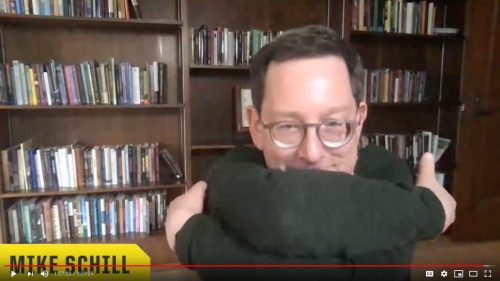
On Monday, March 30, when University of Oregon President Michael Schill spoke to the campus community in a town hall, he offered a virtual hug.
Not this time. Schill had a serious tone as he addressed the campus community throughout a online town hall on the first week of the spring term.
“The university does not have the resources to put off some serious decisions, which will entail some sort of hardship,” he said. “We expect the COVID-19 crisis and the current recession to generate significant financial challenges.”
The biggest news that Schill offered — besides the staggering drop in the number of students staying in housing — is that he would take a pay cut for the immediate six months and that could last for the rest of the fiscal year.
He said he would take a 12 percent pay cut. He currently makes $720,000. Such a pay decrease would mean he’d make $630,000, plus all of his other perks that his job has.
Schill has asked the athletic director and his vice presidents to take significant pay cuts, too. And the university has implemented a hiring freeze unless necessary; that freeze has freed up some money in the budget.
The UO has been long seen as a school that should be taking money from athletics to its academic departments. But Schill said the athletics department has been hit hard by COVID-19, too. The cancellation of March Madness means losing money the NCAA gives schools, and tickets are naturally down from the sports that have had to cancel their seasons.
“It’s already in negative territory,” he said. “I expect athletics to balance its budget.”
Of course, the UO sees more ticket sales from sports like men’s basketball and football — both of which account for a lion’s share of the revenue.
“We can’t take money from those purposes,” he said. “I’d be breaking contracts with donors, and we’d be sued.”
He said generally that more than 4,000 students live on campus. Right now, there are fewer than 300 students.
“We don’t know whether students will stay with us during the spring term or remote instruction,” he said. “We’re not seeing a significant drop in retention rates.”
He added that he doesn’t know what enrollment will look like and a significant drop could be devastating for the financial state of the UO.
“We will get a cut in state support as the state goes into a recession,” he said. “We will all have to make sacrifices.” He said he’s hopeful the university will see a huge fall enrollment and that the state won’t cut higher education during a recession.
“It is the core of economic development of the state,” he said.
The last time the UO’s budget was cut by the state during a recession, about $36 million was slashed, said Patrick Phillips, provost and senior vice president. That’s the budget of the Lundquist College of Business, he added. To compensate, the UO raised tuition. But today the university’s tuition is already at a market level.
He said that the UO needs to work with unions to ensure there is flexibility in contracts. Without flexibility, he added, the UO will have to make draconian cuts.
At the town hall, he wouldn’t say whether there would be any cuts and said it could be a while before cuts happen because there are so many variables, like student enrollment.
“I’m hopeful for a record year. That’s where we were headed before the COVID-19 crisis,” he said.
In the first part of the town hall, Schill vaguely mentioned that there are a number of people who will try to sow doubt in this time and in his leadership. “In the past, there have been some folks who have tried to divide us and sow doubt in the sincerity of its leadership,” he said. “This is not the time for that behavior.”
He added that he’s capable of making mistakes but said not to doubt his motive.
He wrapped up his town hall introduction saying that he’s confident that unions, resident advisors and the rest of the campus will come together and “advance knowledge and promote human progress.” Unions working with the administration was a point he reiterated throughout the town hall.
“One month ago, I would be thinking about which books I was going to buy or where I was going to eat dinner,” he said. “Now I’m thinking of how to save jobs for our faculty or staff.”